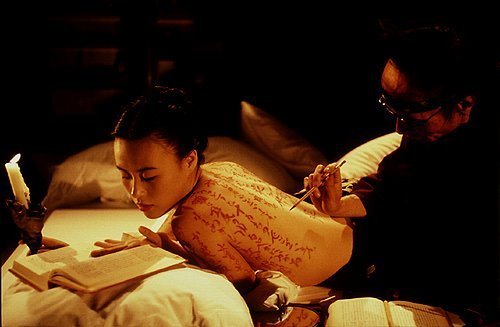
The Pillow Book is one of the masterpieces of Japanese literature. Written during the Heian period by Sei Shonagon, lady-in-waiting of Empress Teishi, it is an impressionistic compendium of hundreds of things classified by categories ("Rare things", "Things that make the heart beat faster", "Things that bring up fond memories of the past", etc.) as well as everyday scenes at the Japanese imperial court at the turn of the 11th century.
Peter Greenaway used the book as a basis for a movie, also titled The Pillow Book, which focuses on Kiyowara Nagiko, a modern-day fan and emulator of Sei Shonagon. Vivian Wu plays Nagiko and Ewan McGregor her Western boyfriend.
Contains examples of:
Original work:
- Alpha Bitch: Sei is this trope for the Empress's court, as the page quote clearly indicates.
- Arc Words: (Ito) okashi – how (very) lovely.
- Decadent Court: Despite being an account of everyday life in such a setting, Sei tends to skim over the political tensions and pretty much ignores the fact that the Empress and her faction are under attack from a competing branch of the Fujiwara family.
- Everybody Has Lots of Sex: Sei describes in detail the proper decorum for a lover's visit and writes of gentlemen roaming the passages of the ladies' quarters, which is fine by her. She just doesn't think they should be doing it when on duty.
- Fangirl: Sei dotes on the Imperial family, especially her beloved Empress Teishi.
- Graceful Ladies Like Purple: And Heian gentlemen too. Violet, purple and mauve costumes are described over and over again.
- Hotter and Sexier: Modern translations of the book are often advertised as incredibly steamy, as if sex is the only thing Sei ever talks about.
- Japanese Politeness: Etiquette at the Heian court was so refined, it would make 18th-century Versailles look sloppy. If you wanted to ask a woman out, you'd better do it in the form of several exquisitely written poems.
- Lady-In-Waiting: If we can believe Sei's own account she was a favorite attendant of Teishi's.
- Male Gaze: Custom requires ladies to hide behind curtains and fans as much as possible. Sei makes a joke of hiding herself from a male acquaintance and pretends annoyance when he finally does chance to get a good look at her.
- Not Staying for Breakfast: Sei writes disparagingly of lovers who don't have the good sense to sneak out before daybreak. In her case, staying for breakfast isn't even an option since one of her Hateful Things is feeding a man who comes on a romantic visit. Even if he had stayed all night, she says, she "won't feed him so much as a bowl of warmed-over rice".
- Really Gets Around: Most members of the court had affairs, and Sei makes no bones about her eye for the gentlemen.
- Shrines and Temples: The ladies of the court regularly go on pilgrimages to famous Buddhist temples.
- Tsundere: Apparently normal romantic behavior at the Heian Court.
- Unlimited Wardrobe: Sei makes a point of mentioning her keen sense of fashion, by describing both her own dress (which never seems to be twice the same) and that of other courtiers. Wear yesterday's fashion and she'll put you straight on the list of "Things that should not be looked at".
- She loosens up a little by the end of the book, saying, "Clogs with trousers may be in fashion right now, but they're still ugly."
- Upper-Class Twit: Plenty of those at the Imperial court.
Movie version:
- Best Served Cold: Nagiko's revenge is years in the making.
- Body Paint
- But Not Too Foreign: Nagiko's mother is Chinese, but her father is Japanese.
- Depraved Homosexual: The Publisher, against whom Nagiko takes revenge.
- Grave Robbing: The Publisher.
- Human Notepad: Fetishised.
- In Name Only: The movie only indirectly refers to the original work, doing so through the prism of a more conventional present-day story of love, revenge, and above all fetishism - namely, writing on human skin.
- Jerk Jock: Nagiko's husband.
- Meaningful Funeral:
- No Name Given: The Publisher, Father, Mother, Aunt, Maid, Husband... In fact Nagiko, Jerome, and Hoki are the only characters in the film who are given names.
